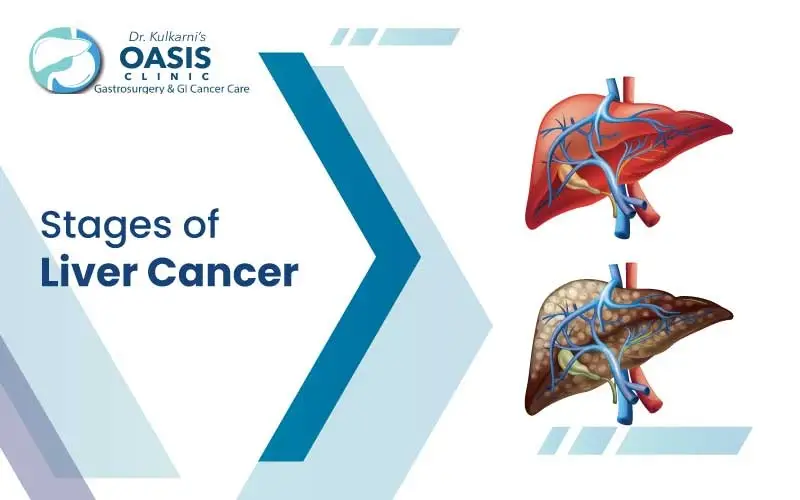Stages of Liver Cancer

Jump On :
Liver cancer is a serious and complex illness that affects many people around the world. There are four stages of liver cancer, depending on how far the disease has progressed. Knowing which stage your liver cancer is in can help you and your doctor develop a plan for treatment and recovery.
Knowing the stages of cancer can help individuals understand their prognoses and make informed decisions about their treatment. It is important to note that liver cancer is divided into two main types, hepatocellular carcinoma, and cholangiocarcinoma. The most curable stage of liver cancer depends on the type of cancer and the overall health of the individual.
Hepatocellular Carcinoma (HCC)
This type of liver cancer is usually found in individuals who have a history of cirrhosis or other types of chronic liver disease. HCC is typically diagnosed at an advanced stage due to its ability to grow quickly without any obvious symptoms.
When caught early enough, HCC can be treated with surgery or ablation, with a 5-year survival rate of up to 75%. However, if it has spread beyond the liver then the survival rate drops drastically to around 10% at 5 years post-diagnosis.
Cholangiocarcinoma (CCA)
This type of liver cancer affects cells in the bile ducts and is most common in people over age 60. CCA typically spreads slowly but can still reach an advanced stage before diagnosis as symptoms may develop late or not appear at all until it has reached a later stage.
If caught early enough, CCA can be treated with surgery or chemotherapy but will still require regular monitoring afterwards to detect any recurrence. The 5-year survival rate for CCA detected in its earliest stages is around 70%, but this drops off significantly when it spreads beyond the bile ducts or involves lymph nodes and other organs.
Here are some most common stages in liver cancer
Stage I:
This stage is when the cancer cells have only started to grow in the liver, and it is still confined within the organ. Treatment at this stage typically involves surgery, which may involve removing part or all of the organ. Depending on how far along the tumor is, chemotherapy or radiation therapy may also be used to treat Stage I liver cancer.
Stage II:
At this stage, the cancer has spread beyond just one area in the liver. Surgery may be an option if part of or all of the affected area can be removed; however, other treatments such as chemotherapy or radiation therapy may also be recommended.
Stage III:
At this stage, parts or all of both lobes of the liver are affected by cancer cells. Treatment options at this point include chemotherapy, radiation therapy, and surgery to remove parts or all of both lobes if possible. This stage is also known as Metastatic Liver Cancer.
Stage IV:
At this final stage, cancer cells have spread outside of the liver to other organs in your body such as your lungs or lymph nodes. Treatment options here include chemotherapy and/or radiation therapy with some cases requiring surgery to remove parts or all of both lobes if possible.
Most Curable Stage of Liver Cancer
The most curable stage of liver cancer is usually stage 1, as long as it’s caught before it spreads too far outside of your liver tissue. This means that early detection is key! Regular screening tests performed by your doctor can help detect any abnormalities in your liver tissue so that they can be treated right away if necessary.
Treatments for Liver Cancer
If you are at risk for developing or have been diagnosed with any stages of liver cancer, there are many treatments available depending on your individual circumstances. These include surgery, chemotherapy, radiation therapy, targeted therapies such as immunotherapy or molecular therapy, and hormone therapy.
It’s important to note that not all treatments are suitable for all stages; some treatments may only be used in certain stages while others may be used throughout all stages depending on their effectiveness in treating each individual case.
Your doctor will work with you to come up with a treatment plan that best fits your needs based on their assessment of your condition.
Conclusion
If you have been diagnosed with any form of liver cancer, early detection is key for successful treatment outcomes!
By staying informed about different types of screenings and treatments available for liver cancer patients today, you will be able to get ahead of this potentially devastating disease before it becomes too difficult to manage or treat successfully. Talk to your doctor today about what options may work best for you!

Dr. Aditya Kulkarni
MS, DNB, FRCS, MCh (Surgical Gastroenterology & GI Oncology)
Dr. Aditya Kulkarni is a Consultant of Laparoscopic and Robotic Gastrointestinal, Hepato-biliary-pancreatic, and Cancer Surgeon at the renowned Oasis Surgery Clinic Pune.
